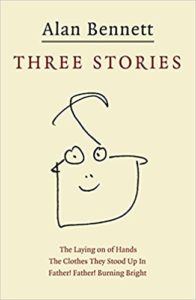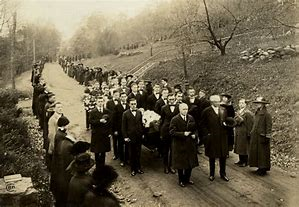 January 2018 has seen my attendance at two funerals, each of close family members. This sad and somewhat macabre coincidence led me to re-read, and take great pleasure in, a short story by Alan Bennett called The Laying on of Hands.
January 2018 has seen my attendance at two funerals, each of close family members. This sad and somewhat macabre coincidence led me to re-read, and take great pleasure in, a short story by Alan Bennett called The Laying on of Hands.
First published in the London Review of Books it found its way into a slim volume entitled Three Stories (Profile, 2003) all of which are shot through with Bennett’s distinctive voice. In his case I mean that literally, because we hear him so often on radio and television reading his own work. The dry, Yorkshire-accented tones, with flat vowels but expressive and carefully used inflection, to emphasise or act in counterpoint to the meaning of the words, is very well-known to us.
The story relates events at a memorial service for Clive, a recently deceased masseur (and much else, we learn, besides). It sprang to mind at the funeral which I most recently attended, because of the presence in the congregation of a grey haired lady of advanced years who was, apparently, unknown to the grieving family (and this within a fairly circumscribed north of England community). In The Laying On there is just such a grey haired old lady, assumed, by the other members of the congregation, to be a relative, a great aunt maybe, of Clive’s and she is addressed as such by a number of them during the service (though, as she is almost completely deaf, this makes very little impression).
Father Joliffe, the fictional clergyman presiding, knows her to be Miss Wilshere, who regularly attends the funerals and memorial services of people  whom she did not know. Decked out in the appropriate mourning garb she appears to be a bereaved, if never actually the bereaved in any particular case and often receives invitations or offers of transport to the post funeral celebrations of lives well lived (or otherwise). Invitations which she always accepts.
whom she did not know. Decked out in the appropriate mourning garb she appears to be a bereaved, if never actually the bereaved in any particular case and often receives invitations or offers of transport to the post funeral celebrations of lives well lived (or otherwise). Invitations which she always accepts.
Our real grey-haired lady did not, however, appear at the post-funereal refreshments so was not a Miss Wilshere manqué. It would be fun to think that speculation about her ran riot, but, this being a funeral, such imaginative flights were consigned to the box marked ‘fanciful’ whilst the serious business was got on with. There would be no rioting of any kind. Nonetheless, it set me thinking about funerals and funerary rites in English stories more generally.
Probably the oldest are the funerary rites in Beowulf, which begins with the funeral of King Shield Sheifson and ends with Beowulf’s own. Death features often in Shakespeare, though the funerals I could recall were Ophelia’s, which the eponymous Prince manages to  hijack and, of course, Julius Caesar’s. The Jacobeans, so often regarded as the black tragedians, don’t have that many funerals (or at least ones I can remember) just a lot of gore and cruelty. This tendency is shared by Poe, who writes often about death or near death, but whose only ‘funeral’ I could conjure is in The Masque of the Red Death and that is more by way of a living wake for those about to die.
hijack and, of course, Julius Caesar’s. The Jacobeans, so often regarded as the black tragedians, don’t have that many funerals (or at least ones I can remember) just a lot of gore and cruelty. This tendency is shared by Poe, who writes often about death or near death, but whose only ‘funeral’ I could conjure is in The Masque of the Red Death and that is more by way of a living wake for those about to die.
One imagines that there are lots of funerals in Victorian literature, it was an age when death was hedged about so much by ritual, customs and things (the jet industry meant something rather different then), but there are fewer than one thinks. Dickins, in some ways that archetypical Victorian, has some, but while he does death scenes relatively frequently, there is not so much ceremonial – and it’s the same in the Brontes. Middlemarch sees a miser’s funeral (and much speculation about whence his money is bound) and Hardy has several plotlines which depend upon deaths, though, again, he doesn’t necessarily tell of the funerals.
In the twentieth century there is Faulkner’s As I Lay Dying and Joyce’s Ulysses. Greene’s The Third Man begins with the funeral of Harry Lime. More modern writers seem to be prepared to tackle this rite of passage for those who are still living and some of them find comedy. I seem to remember a short story about a ‘corpse’ who awakens at his own wake, but cannot remember who wrote it (if you know please tell me), which brings us back to the Bennett.
Now I will re-read the other two stories.
If you want to read more about books try Novels Historical Two Novels Historical Reading 2017


 RSS – Posts
RSS – Posts